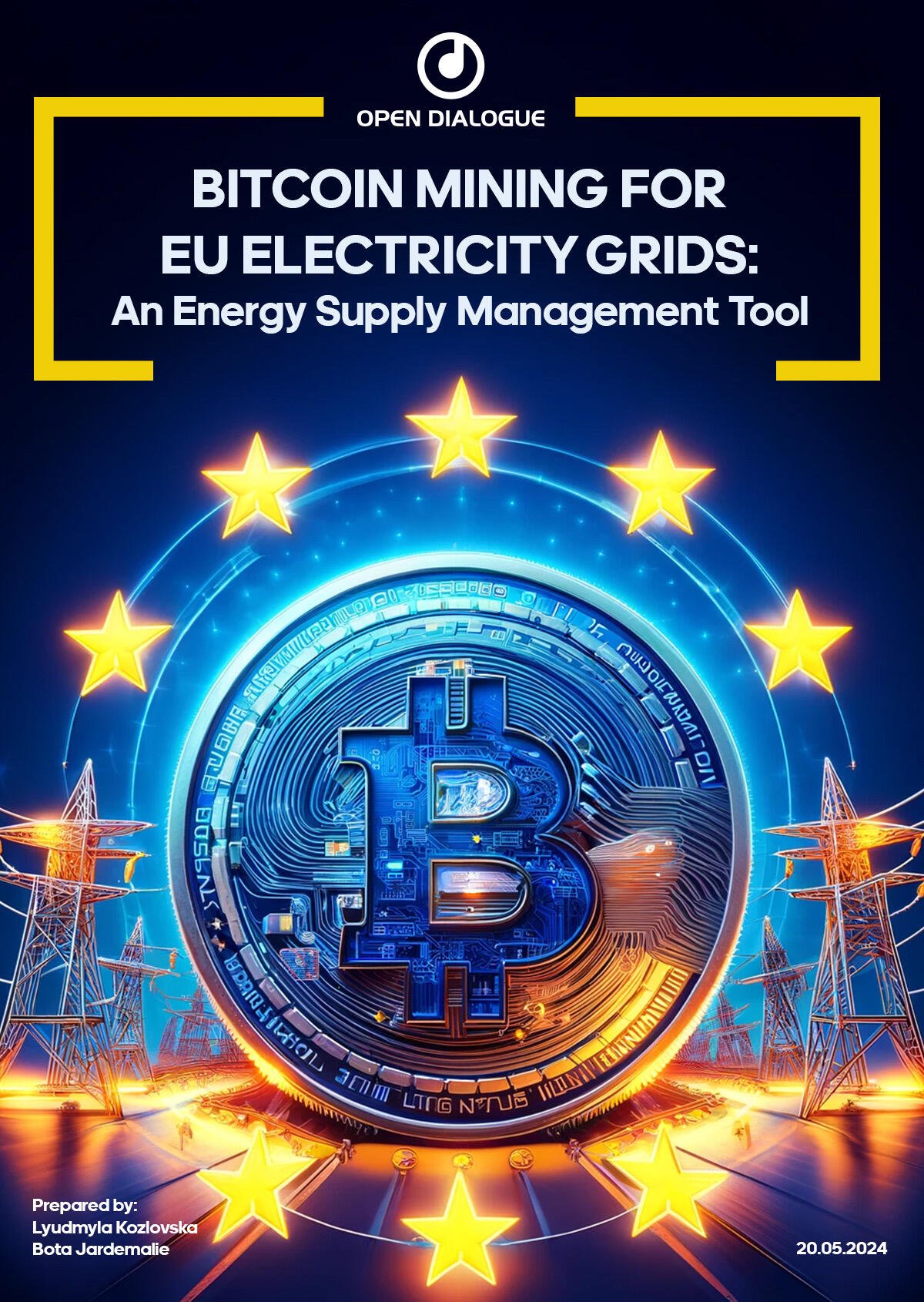xplbzx on Nostr: Proof-of-work #bitcoin mining advocacy in #EU #geyserfund 148,675 users ...
Proof-of-work #bitcoin mining advocacy in #EU #geyserfund
148,675 users [stats.nostr.band] x 937 sats = €100,000
defendpow@geyser.fund
geyser.fund/project/defendpow
donate@bps.odfoundation.eu
#defendpow #EC #Hashlabs #RISE #ESMA
quoting note1crs…y3p3FIVE FACTS WHY BITCOIN MINING BENEFITS EU'S ENERGY AND ENVIRONMENTAL SECURITY
1. European Commission is looking for €584bn of new investments are required by 2030 to upgrade Europe’s grids. What solutions can the #EU adopt?
Our BTC Coalition collected best case studies & testimonials from industry experts to present how #Bitcoin Mining is New Solution to the EU Grid Problem:
🔻Bitcoin mining can facilitate energy transition in the EU, especially to the huge queues of renewables, such as wind & solar that have applied.
🔻As testified in our submission Bob Burnett: "Bitcoin mining is already an industry at the forefront of utilising sources like solar and wind. (…) I strongly encourage the EU, the European Commission and #ESMA to support the development and expansion of Bitcoin and Bitcoin mining in Europe and across the globe."
🔻As noted by Drew Armstrong, President and CEO of the @CathedraBitcoin, a Canadian Bitcoin mining company: “(…) proof-of-work mining can help transform the energy sector for the better, by ensuring no energy goes to waste, thereby potentially reducing the cost of energy for citizens.”
🔻As Kent Halliburton, the CEO and co-founder of Sazmining suggests: “By strategically establishing mining operations, the EU can stimulate private investment in grid enhancement, aligning with long-term goals for energy system decarbonisation and fostering job creation and economic growth within the energy sector.”
2. BITCOIN MINING DEVELOPS NEW OFF-GRID ENERGY SOURCES AND PROMOTES RENEWABLES
🔻As stated by Bob Burnett, CEO of Barefoot Mining (USA): “Bitcoin mining is demonstrating its capability to utilise and even develop new renewable energy sources independently of traditional electricity grids.”
Bitcoin Mining addresses two critical challenges currently recognised by the #EC: (a) lengthy grid connection queues for renewable projects, and (b) the overproduction of renewable energy.
🔻Edouard Dubrana, CEO of Eddu Energy (France) states that: “[t]his industry, although energy-intensive, can adjust its consumption in real time, using surplus energy that would otherwise be wasted. This not only helps stabilise the network by absorbing production peaks but also provides an economic advantage by generating additional revenue for network operators and energy producers. Thus, Bitcoin mining can play a pivotal role in the transition towards a greener and more flexible energy grid, while fostering a circular energy economy.”
🔻Kent Halliburton, the CEO and co-founder of Sazmining Inc., explains how their mining operations optimise surplus hydroelectric energy in Latin America: “Our facilities in Paraguay utilise surplus energy from the Itaipu Dam, one of the largest hydroelectric plants in the world. This energy, which would otherwise potentially go to waste or be sold at lower values to #Brazil due to market oversupply, is efficiently used in our Bitcoin mining operations at 4.3 cents per kWh. Our business's ability to absorb this surplus energy during off-peak times is crucial in preventing energy waste and supporting the economic sustainability of the hydroelectric plant.”
3. SOCIAL & ENVIRONMENTAL USE OF BITCOIN MINING
We challenged #ESMA's discriminatory regulatory language about #Bitcoin mining, misconceptions in discussions in the EU and in the member states of the Council of Europe, like #Norway, #Iceland, that have highlighted concerns about the energy consumption of Bitcoin's #PoW mechanism, notably critiqued in a United Nations study.
The transformational potential of Bitcoin mining for local communities should not be overlooked, that's why we've added more cases about the social and environmental benefits of Bitcoin mining in the new submission:
🔻As Sebastien Gouspillou, CEO of Big Block Data Center testified on “How Bitcoin Mining is Supporting Conservation Efforts at Virunga National Park (#Congo)”. Seb illustrates how the financial challenges of this UNESCO World Heritage site were addressed by leveraging existing hydroelectric infrastructure for mining purposes.
🔻Pierre Rochard testified: "In a recent report, the European Central Bank characterised Bitcoin as an unproductive, energy-intensive technology that lacks social value and presents an obstacle to the EU’s climate goals. Regrettably, the EU has demonstrated similar hostility in its evaluation of Bitcoin and its impact on society. But the EU and @ECB’s estimation of Bitcoin neglects new research from organizations in academia, finance, and human rights that paints a starkly different picture of the world’s most successful cryptocurrency".
🔻Marin Baksa testified: "As the EU continues to develop sustainability indicators for crypto-assets, it is essential to consider emerging technologies that can mitigate the negative externalities associated with Bitcoin mining."
4. BITCOIN MINING AS A SOLUTION FOR EU's COAL REFUSE POLLUTED AREA
🔻The case of Stronghold Digital Mining (#USA) described by Thomas Pacchia illustrates how Bitcoin mining can be a solution in an industrially polluted area.
The company’s two power plants in Pennsylvania turn a hazardous waste product from #coalmining (#coal refuse or #gob) into #energy for Bitcoin mining.
“[R]ather wasting away and polluting people and the environment, coal refuse is instead collected and transported to be sorted, processed, and broken apart. After that, gob reaches a boiler to be burned down, producing electricity which powers Bitcoin mining.”
The uniqueness and value of this application lies in solving the problem of cleaning up this dangerous waste, which is normally most often piled up due to otherwise very low commercial viability.
The value of this application lies in its ability to address the problem of coal refuse, which is typically accumulated due to its low economic viability. By utilising coal refuse, these plants generate electricity that powers Bitcoin mining operations.
The facilities of the Stronghold Digital Mining are “examples of the Bitcoin mining operation which could help the EU member states and other countries in cleaning up and remediating after an ecological disaster. In 2016, there were 324 coal plants in Europe. Each of them produced coal ash, the byproduct left over from burning coal to produce electricity, which can leach into groundwater, pollute waterways, and contains heavy metals considered to be carcinogens,” - notes Thomas Pacchia.
5. BITCOIN MINING HELPS DESALINATION OF WATER, DECARBONISATION OF DISTRICT HEATING NETWORKS AND DATA CENTRES
🔻As described by Marin Baksa, CEO of Barrage Nordx (#Sweden), immersion cooling is “a method that involves submerging servers, including #Bitcoin mining servers, in a non-conductive liquid, which greatly enhances energy efficiency and reduces the environmental impact of these operations.
(..) Unlike air-cooled systems that expel waste heat into the environment, #immersion cooling captures and recycles this heat through a liquid medium. This not only improves thermal management but also contributes to a quieter and more environmentally friendly #datacentre environment.
(…) Additionally, this method facilitates more effective #heat recovery, as the heat transferred to the cooling liquid can reach higher temperatures and be reused more efficiently than air, making it particularly suitable for district [urban] heating.” Practical analysis of this technique was the subject of two reports (2022 and 2023) by #RISE Research Institutes of Sweden AB.
🔻Pierre Rochard, Vice President of Research, Riot Platforms, Inc. notes that: “Bitcoin’s critics have removed context from the conversation surrounding Bitcoin and water consumption.”
Pierre Rochard provides expertise regarding the countries in the #MiddleEast suffering from #water #scarcity and “utilising energy-intensive desalination process, which are using heat from Bitcoin miners to increase the efficiency of desalination. Two companies— Zero Two and Marathon Digital—for example, have built technology to recycle heat from Bitcoin mining rigs to facilitate the #desalination process, allowing them to desalinate more water for the same net cost.”
🔥There is a great potential for synergy between Bitcoin mining and #decarbonisation of district heating systems in the #EU. As bitcoin mining operations scale up to industrial levels and adopt advanced immersion cooling technologies, they also produce significant amounts of waste heat.
This waste heat can be repurposed, offering a sustainable heating solution for district energy systems, which are traditionally powered by combustion of fossil fuels, biomass, or garbage. Most of these systems are shifting to electricity, primarily through heat pump technology, in alignment with the EU's decarbonisation goals.
Co-locating Bitcoin mining facilities with district heating plants creates a mutually beneficial relationship. The waste heat from Bitcoin mining can directly supply the heating needs of these systems, effectively aiding in their transition to cleaner energy sources. This integration can provide an independent source for financing the conversion to electric-based heating systems and significantly reduce the need for financial subsidies.
Examples of such initiatives include companies like @MintgreenHQ in #Canada with the North Vancouver district energy system, and #Hashlabs in Finland, which offering the system that captures the heat generated by Bitcoin mining operations to warm water in a central heating system. In New York, USA, Bitcoin mining is used to heat pools in #bathhouses.
This five facts from the Submission will be presented to the newly elected members of the European Parliament, the European Commission, and all other pertinent EU bodies.
We advocate for a balanced, evidence-based approach in the formulation of regulations that recognise the substantial potential benefits of Bitcoin mining. This approach will not only support the EU’s sustainability goals but also foster innovation and economic growth within the Union.
We are very grateful to Matt Carlsson, MASc, PEng, for his expert review of this submission. ⚡️🫡
LN to donate in Bitcoin and support our advocacy work in the EU and US:
🫡 defendpow@geyser.fund
🫂 donate@bps.odfoundation.eu
We providing more details in written submission:
https://en.odfoundation.eu/content/uploads/2024/05/20.05.2024_odf_bitcoin_mining_eu_elect_grids_eng-1.pdf
